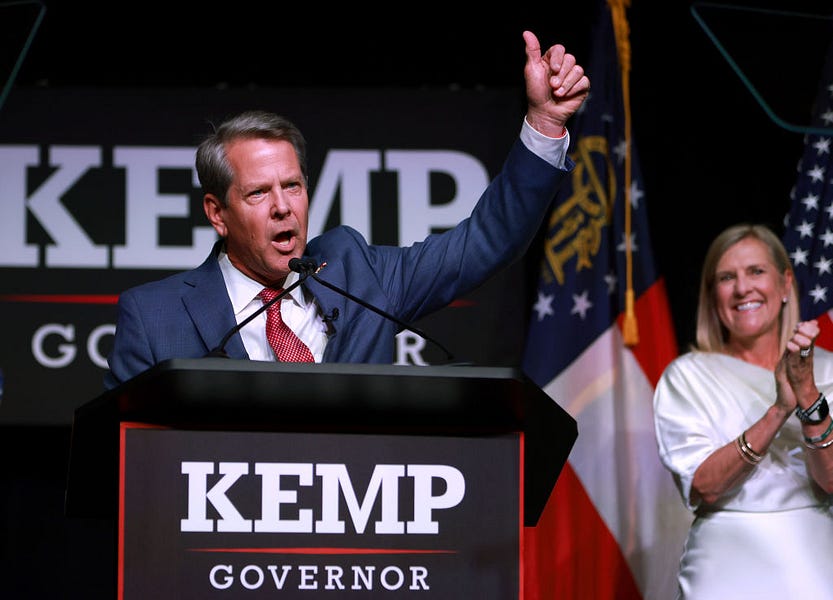ATLANTA—Eighteen minutes before polls closed in Georgia’s primaries Tuesday night, workers wheeled tubs of iced champagne through the College Football Hall of Fame.
Though likely standard fare for the open bars flanking Georgia Gov. Brian Kemp’s election watch party, the celebratory staple wasn’t out of place. No one walking into the party doubted what the Republican gubernatorial primary’s result would be. The question was the margin of Kemp’s victory.
In the months ahead of Tuesday’s Republican primaries in Georgia, former Sen. David Perdue’s challenge against Gov. Brian Kemp had been billed as a centerpiece of Donald Trump’s “revenge tour”—retribution against those Republicans who failed to line up behind his abortive attempt to steal the 2020 election from Joe Biden. Kemp’s transgression was failing to call a special session of the legislature to let Republicans try to impanel an “alternate” slate of Trump-supporting electors despite Biden’s victory in the state. In recent months, Trump traveled to Georgia to stump for Perdue and to castigate Kemp as a “RINO” and a “turncoat,” a “coward” and a “complete and total disaster.”
But in the end, it just wasn’t close. Less than two hours after voting ended, with only about 10 percent of precincts reporting, major outlets started sticking a fork in Perdue. With 95 percent of the ballots counted as of Wednesday morning, Kemp is on track to win by 52 percentage points (74 percent to Perdue’s 22 percent).
On the ground with the candidates, the outcome was clear even earlier than that. You could practically smell the futility coming off the Perdue event, held in a grim conference room at a Cobb County Sheraton, a 20-minute drive from Kemp’s raucous party. Only a couple dozen supporters were on hand to drink and munch hors d’oeuvres as the results came in; a few top boosters, including Trump ally Bruce LeVell and DeKalb County GOP Chair Marci McCarthy, took the stage to offer brief, pro forma remarks.
“We need to keep Georgia red,” McCarthy said. “But not just the red that is the RINO—it is the red that is the MAGA.”
It was the culmination of weeks of stagnation. With polls looking worse and worse, Perdue seemed to throw in the towel in the campaign’s closing days, making few public appearances and turning off the spigot for radio and TV ad buys as outside groups pulled their funding too. Kemp, by contrast, campaigned hard to the end despite his large lead—seemingly relishing the opportunity to bury a onetime ally who spent much of the last year lambasting him as a failure to his state.
This, no doubt, was a significant reason the final result was so lopsided—outstripping even the cartoonish-seeming 30-point margin Kemp had opened in the polls in recent weeks. By primary week, the “revenge tour” script had been totally flipped—far from an occasion for Trump to show his dominance, the race had become an opportunity for his former vice president, Mike Pence, to flaunt his independence. Pence joined Kemp on the campaign trail the day before the primary.
Perdue’s total collapse may even have contributed to the surprise success of another Trump-opposed candidate: Secretary of State Brad Raffensperger, who has secured 52 percent of the vote in his primary, enough to avoid a runoff against Trump-backed challenger Rep. Jody Hice.
Just after 8:30, Perdue appeared on stage at the Sheraton to deliver the bad news: He had just called Kemp to congratulate him on his win, and he would be a tireless supporter of Kemp’s bid to defeat Democrat Stacey Abrams this November.
“Everything I said about Brian Kemp is true. But here’s the other thing I said is true: He is a much better choice than this Stacey Abrams. So we are going to get behind our governor. … There’s nothing they can ask me to do that I won’t do.”
Even here, in the Republican primary, some attendees muttered darkly about the possibility of fraud. When Perdue suggested that “I can’t explain these results” because they were “counter to what I saw around the state,” he drew scattered shouts of “2,000 Mules!”—a reference to the recent Dinesh D’Souza movie alleging widespread fraud in the 2020 election. One woman proclaimed aloud she would remain “Never Kemp.”
Trump and Perdue’s theory of the race had been that this was a common sentiment among Republican voters—that Kemp had irredeemably damaged himself in the eyes of the MAGA base in 2020 and therefore would not be up to the challenge of facing Abrams. But that message never really took hold, even among most of Perdue’s own supporters. Last month, one man at a Perdue rally told The Dispatch that Kemp was “a traitor to the state of Georgia and a traitor to this country,” but that he wouldn’t hesitate to back him in the general election. After the race was called Tuesday, McCarthy told The Dispatch that “I believe Republicans will put our differences aside and unite behind Brian Kemp to re-elect him as Georgia’s governor.”
If Trump and Perdue’s theory didn’t take among Perdue’s own supporters, the notion that Perdue was a serious threat to Kemp never took hold with the governor and his camp. Kemp mentioned Perdue only once during his victory speech Tuesday night at the College Football Hall of Fame. And even then, it served more as an on-ramp for Kemp to again address the main focus of his re-election campaign thus far: his next opponent. “I want to also thank David Perdue for the nice phone call that he gave me just a little while ago, pledging his full support,” Kemp said. Then right on to Abrams. “I want to be crystal clear with all of you here tonight: Our battle is far from over. Tonight, tonight the fight for the soul of our state begins, to make sure that Stacey Abrams is not gonna be our governor or the next president.”
For all the vitriol Perdue and Trump spewed at Kemp—with Trump going so far as to say in September that he thought Abrams would make a better governor than Kemp—the governor never reciprocated on the campaign trail. Stumping with former Trump Vice President Mike Pence Monday, Kemp told reporters Trump may be mad at him, but he’s not mad at Trump. “I’ve never said anything bad about him,” Kemp said. “I don’t plan on doing that. I’m not mad at him. I think he’s just mad at me. And that’s something that I can’t control.”
Kemp never appeared mad Tuesday night either. Nor did his supporters. The election party never felt like anything besides a victory party. Hundreds of Kemp supporters made their way into the College Football Hall of Fame lobby—with a wall of football helmets looking down on them. Many slapped Kemp stickers to their lapels. Others signed their name to a mammoth Kemp banner, and others posed for photos in front of a Kemp backdrop. With live country music playing, they meandered onto a mini-football field—complete with artificial turf—grabbed beers or cocktails and filled plates with heavy hors d’oeuvres. Two large TV screens displayed election returns as they rolled in, though there was never any drama for the small groups that clustered around them. The crowd buzzed all night long, but when Kemp took the stage shortly after 9:30, his supporters frequently interrupted his speech with cheers and chants of “Four more years!”
The Kemp supporters around the room took their cues from Kemp’s calm campaign demeanor, hardly bringing up Perdue themselves with reporters and only mentioning Trump when pressed. Most touted the record Kemp himself has touted throughout the campaign: aggressive back-to-normal-life policies early in the COVID-19 pandemic, a strong state economy, and passage of a 2021 voting law that, though pilloried by President Joe Biden and progressives, pleased Republicans concerned about election security. And it may have helped drive record midterm turnout Tuesday by codifying some emergency pandemic measures, such as expanded early voting, into law.
If political reporters have framed Tuesday’s Republican primary as a showdown between Trump and an adversary, several Kemp supporters who came to rally behind their governor Tuesday made clear which side they’re on. “There’s a case that [Trump] is the worst person that we’ve ever had as president,” Eric Oliver, who voted for Trump both in 2016 and 2020, told The Dispatch. “People are done with his toxic chaos.”
As we’ve repeatedly written, it would be a mistake to read Tuesday’s result as evidence that Trump’s sway in the Republican Party has broken. Out of office and off Twitter, he may no longer be the 24/7 field general of the party, driving every news cycle and constantly reestablishing himself in his base’s eyes as their champion. But he nevertheless remains the preeminent arbiter of party opinion—no one’s approval is worth more in a Republican primary, as strong showings in recent weeks by favored candidates in Ohio, North Carolina, and Pennsylvania have shown.
Rather, Kemp’s triumph over Perdue shows that the issue about which Trump remains most fervent—the supposed illegitimacy of his loss in 2020—is also the issue where his ability to bend the party’s voters to his will is the weakest. Georgia voters were faced with a choice: Reward Kemp for years of conservative policymaking, or punish him for refusing to go along with the stolen-election charade. It couldn’t be clearer which option they preferred.
“Trump just wears you down,” Don Balfour, a former 20-year state senator and now Waffle House executive, said of the stolen election narratives while at the Kemp party Tuesday. “Trump just wears you down talking about it.” Still he’s betting that the stolen election rhetoric fades away among Perdue supporters: “This November people who adamantly believe the election was totally stolen—they’re not gonna vote for Stacey Abrams. They’re gonna vote for Brian Kemp.”









Please note that we at The Dispatch hold ourselves, our work, and our commenters to a higher standard than other places on the internet. We welcome comments that foster genuine debate or discussion—including comments critical of us or our work—but responses that include ad hominem attacks on fellow Dispatch members or are intended to stoke fear and anger may be moderated.